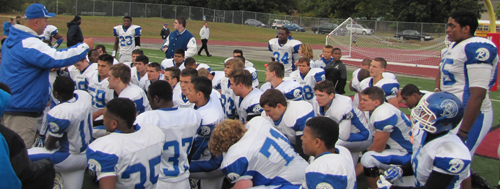Parpan Column: The importance of a family discussion on football

At 6-foot-4 and the Arby’s side of 300 pounds, I get asked a lot about my past life as a football player.
The truth is, I didn’t play much growing up.
I played youth football the summer going into fifth grade until my parents gave me the option of quitting after my coach was arrested on — of all things — a domestic violence charge.
I then decided to give it a go again as a freshman at Longwood High School, only to find out I wasn’t very good and probably not tough enough to play the sport.
I remember one particular day when my teammates and I were all assigned a number and asked by the coaches to stand in a circle. The head coach called out random numbers and we were expected to run to the center of the circle and blast each other. My number got called often that day and what resulted was a combination of me getting steamrolled by better players or embarrassing myself with soft hits on the smaller ones.
I remember biting my lip until it bled, hoping my coaches would allow me to sit out the remainder of the drill. It didn’t work.
That said, I’ve always loved the game. I’ve just never been any good at it.
My wife, Vera, on the other hand, hates football. She doesn’t understand the rules, doesn’t want to learn them and has a general aversion to the sport. Except maybe to chuckle at Richard Sherman’s antics or to peek up from her iPhone at a game or an episode of HBO’s “Hard Knocks,” she has no room for football in her life.
She hopes our infant son, Jackson, falls on her side of a debate that started long before she was ever pregnant, when we were watching an episode of another HBO Sports production, “Real Sports with Bryant Gumbel.” The centerpiece of that month’s episode was on former pro wrestler and college football player Chris Nowinski and his work as co-founder and executive director of Sports Legacy Institute, an organization aimed at solving football’s concussion crisis through education, awareness, policy and research.
“Real Sports” contributor Bernard Goldberg has since conducted several outstanding interviews with Mr. Nowinski, each one demonstrating how SLI’s research with Boston University has shown that concussions have led to chronic traumatic encephalopathy, once known as “punch-drunk syndrome,” for many former NFL players.
To quote Boston University’s CTE website, common symptoms of the disorder include “memory loss, confusion, impaired judgment, impulse control problems, aggression, depression, suicidality, parkinsonism, and eventually progressive dementia. These symptoms often begin years, or even decades after the last brain trauma or end of active athletic involvement.”
It’s a scary reality that had Vera and me questioning whether we would ever let our son play the sport a couple years before she even gave birth. For her, there’s never been any doubt: He won’t play.
For me, it’s not that simple — and not just because I’m a fan of the game. I never wanted to be the dad who tells his son he can’t participate in an organized sport or club he really wants to participate in, especially when — like football — it’s one that can be very good for him and is something a million school-aged kids do each year. I can remember some of my friends not being allowed to play football, and how their parents eventually relented as the kids pouted their way onto the gridiron.
My parents generally let me try whatever I wanted, allowing me to get a lot of things that weren’t for me out of my system. I tried — and failed to do well at — lacrosse and wrestling, Cub Scouts and school band. (Though I think I recall how to play “Hot Cross Buns” on a trumpet. I think.)
It’s not that my parents never said no or didn’t know how to be strict at times. They encouraged me to do my best and let me know in a gentle way when my best wasn’t very good. They’d usually end up telling me to work harder at it or apply my time to something else.
Knowing I love sports, many of my friends and family have been purchasing athletics-themed toys and clothing for Jackson. He even has a handful of shirts that say how “tough” he is. Then there’s the Victor Cruz jersey, the Jets pajamas and the projection toy that shines the Giants’ NY logo on his bedroom’s ceiling. It all makes me wonder if our kid has any choice but to like football.
Of course, the conversation about whether he should be allowed to play has been dialed up since the recent death of Shoreham-Wading River football player Tom Cutinella and two other high school players elsewhere in the U.S.
While it’s too simplistic to say football is a dangerous game that our youth should not play, news of a player’s death is a reminder that families should understand the risks associated with the game and have discussions about them.
There was once a time when Vera would say our son is never playing, and I’d bite back with a playful “We’ll see about that.”
As I settled in to watch the Giants game Sunday night, Vera peeked up from her iPhone just long enough to see Eagles running back Brian Westbrook absorb a hard hit on a particular play.
“This game is so brutal,” she said. “Who would want to hit somebody like that?”
I looked down at the floor for a second, thinking of a way to defend the game I love. I said nothing.
The author is the executive editor of Times/Review Newsgroup. He can be reached at [email protected] or 631-764-4401.








